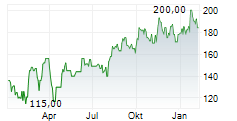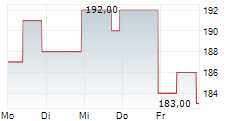COPENHAGEN, Denmark, Nov. 07, 2025 (GLOBE NEWSWIRE) -- Ascendis Pharma A/S (Nasdaq: ASND) today announced that a new pooled analysis showed sustained and clinically meaningful improvements in renal function in adults with hypoparathyroidism treated with TransCon PTH (palopegteriparatide) through Year 3 of the Company's Phase 2 PaTH Forward and Phase 3 PaTHway trials. The data, which confirm results for each individual trial presented at major endocrinology meetings earlier this year, were shared during Kidney Week 2025 in a poster presented by lead author Dr. Elvira Gosmanova, a nephrologist at Albany Medical College and Albany VAMC (New York).
"The magnitude and trajectory of improvement in eGFR in patients treated with TransCon PTH were consistent across the individual trials and pooled analysis, confirming the robustness of these findings across a diverse population of adults with hypoparathyroidism," said Dr. Stuart M. Sprague, Professor of Medicine at University of Chicago and Director of Nephrology Research at Endeavor Health, who was a co-author on the poster. "Compromised kidney function is a serious complication and I am confident that nephrologists, endocrinologists, and the broader hypoparathyroidism community will find value in these groundbreaking results."
The PaTH Forward and PaTHway trials included a combined 141 adults with hypoparathyroidism, 139 of whom (mean age 49 years) are represented in the pooled analysis. The PaTH Forward and PaTHway trials comprised randomized, double-blind, placebo-controlled periods through Weeks 4 and 26 and open-label extension periods through Weeks 266 and 182, respectively. An eGFR =30 mL/min/1.73 m2 was required for trial eligibility. The three-year data were analyzed post-hoc and included evaluation of the long-term impact of TransCon PTH on renal function as assessed by eGFR. Mean (SD) baseline eGFR in the trials was 69 (17) mL/min/1.73 m2. The pooled analysis included 41 patients with a mean baseline eGFR <60 mL/min/1.73 m2 and 98 patients with a mean baseline =60 mL/min/1.73 m2. Safety assessments included 24-hour urine calcium excretion and treatment-emergent adverse events (TEAEs).
At Year 3, =91% of patients receiving palopegteriparatide in both trials were independent from conventional therapy (defined as taking no active vitamin D and =600 mg/day of calcium) and =84% patients had normocalcemia (8.3-10.6 mg/dL). Sustained and clinically meaningful improvements in eGFR (= 5 mL/ min / 1.73 m2) were observed in 70.3%, with numerically greater improvements observed in those with lower baseline eGFR. The greatest increases in eGFR were observed in the first 6 months of treatment with TransCon PTH, with a continued upward trend thereafter. Mean (SD) eGFR increased from baseline to Year 3 by 9.8 (10.9) mL/min/1.73 m2 in PaTH Forward and by 8.8 (11.9) mL/min/1.73 m2 in PaTHway.
Reductions in 24-hour urinary calcium excretion were observed and maintained within the normal range through Year 3.
In both trials, TransCon PTH was generally well tolerated, with no new safety signals identified. Most treatment-emergent adverse events (TEAEs) were mild to moderate (Grade 1 or 2) and no patients discontinued due to treatment-related TEAEs.
"We are pleased to share this analysis of a larger group of patients, showing the reproducibility of the eGFR improvements over time. These observations further emphasize the importance of replicating normal PTH physiology with TransCon PTH in adults living with hypoparathyroidism," said Aimee Shu, M.D. Executive Vice President of Endocrine & Rare Disease Medical Science and Chief Medical Officer at Ascendis Pharma. "This is our first such presentation at a nephrology-focused meeting, and we look forward to continuing the conversation about the significance of PTH replacement to overall kidney health in this patient population."
TransCon PTH is a prodrug of PTH (1-34), administered once daily, designed to provide active PTH within the physiological range for 24 hours/day, approved as YORVIPATH® in the United States, European Union, and European Economic Area as a treatment for adults with hypoparathyroidism.
About Hypoparathyroidism
Hypoparathyroidism is an endocrine disease caused by insufficient levels of parathyroid hormone (PTH), the primary regulator of calcium and phosphate balance in the body, acting directly on bone and kidney and indirectly on the intestine. Individuals with hypoparathyroidism may experience a range of severe and potentially life-threatening short-term and long-term complications, including neuromuscular irritability, renal complications, extra-skeletal calcifications, and cognitive impairment. Post-surgical hypoparathyroidism accounts for the majority of cases (70-80%), while other etiologies include autoimmune and idiopathic causes.
About Ascendis Pharma A/S
Ascendis Pharma is a global biopharmaceutical company focused on applying our innovative TransCon technology platform to make a meaningful difference for patients. Guided by our core values of Patients, Science, and Passion, and following our algorithm for product innovation, we apply TransCon to develop new therapies that demonstrate best-in-class potential to address unmet medical needs. Ascendis is headquartered in Copenhagen, Denmark, and has additional facilities in Europe and the United States. Please visit ascendispharma.com to learn more.
Forward-Looking Statements
This press release contains forward-looking statements that involve substantial risks and uncertainties. All statements, other than statements of historical facts, included in this press release regarding Ascendis' future operations, plans and objectives of management are forward-looking statements. Examples of such statements include, but are not limited to, statements relating to (i) nephrologists, endocrinologists, and the broader hypoparathyroidism community finding value in the results of the new pooled 3-year analysis of the Ascendis' Phase 2 PaTH Forward and Phase 3 PaTHway trials, (ii) the significance of PTH replacement to overall kidney health, (iii) Ascendis' ability to apply its TransCon technology platform to make a meaningful difference for patients, and (iv) Ascendis' application of its TransCon technologies to develop new therapies that demonstrate best-in-class potential to address unmet medical needs. Ascendis may not actually achieve the plans, carry out the intentions or meet the expectations or projections disclosed in the forward-looking statements and you should not place undue reliance on these forward-looking statements. Actual results or events could differ materially from the plans, intentions, expectations and projections disclosed in the forward-looking statements. Various important factors could cause actual results or events to differ materially from the forward-looking statements that Ascendis makes, including the following: dependence on third party manufacturers, distributors and service providers for Ascendis' products and product candidates; unforeseen safety or efficacy results in Ascendis' development programs or on-market products; unforeseen expenses related to commercialization of any approved Ascendis products; unforeseen expenses related to Ascendis' development programs; unforeseen selling, general and administrative expenses, other research and development expenses and Ascendis' business generally; delays in the development of its programs related to manufacturing, regulatory requirements, speed of patient recruitment or other unforeseen delays; Ascendis' ability to obtain additional funding, if needed, to support its business activities; the impact of international economic, political, legal, compliance, social and business factors, including tariffs and trade policies. For a further description of the risks and uncertainties that could cause actual results to differ from those expressed in these forward-looking statements, as well as risks relating to Ascendis' business in general, see Ascendis' Annual Report on Form 20-F filed with the U.S. Securities and Exchange Commission (SEC) on February 12, 2025, and Ascendis' other future reports filed with, or submitted to, the SEC. Forward-looking statements do not reflect the potential impact of any future licensing, collaborations, acquisitions, mergers, dispositions, joint ventures, or investments that Ascendis may enter into or make. Ascendis does not assume any obligation to update any forward-looking statements, except as required by law.
Ascendis, Ascendis Pharma, the Ascendis Pharma logo, the company logo, TransCon, and YORVIPATH® are trademarks owned by the Ascendis Pharma group. © November 2025 Ascendis Pharma A/S.
| Investor Contacts: Chad Fugere Ascendis Pharma ir@ascendispharma.com | Media Contact: Melinda Baker Ascendis Pharma media@ascendispharma.com |
| Patti Bank ICR Healthcare +1 (415) 513-1284 patti.bank@icrhealthcare.com |




